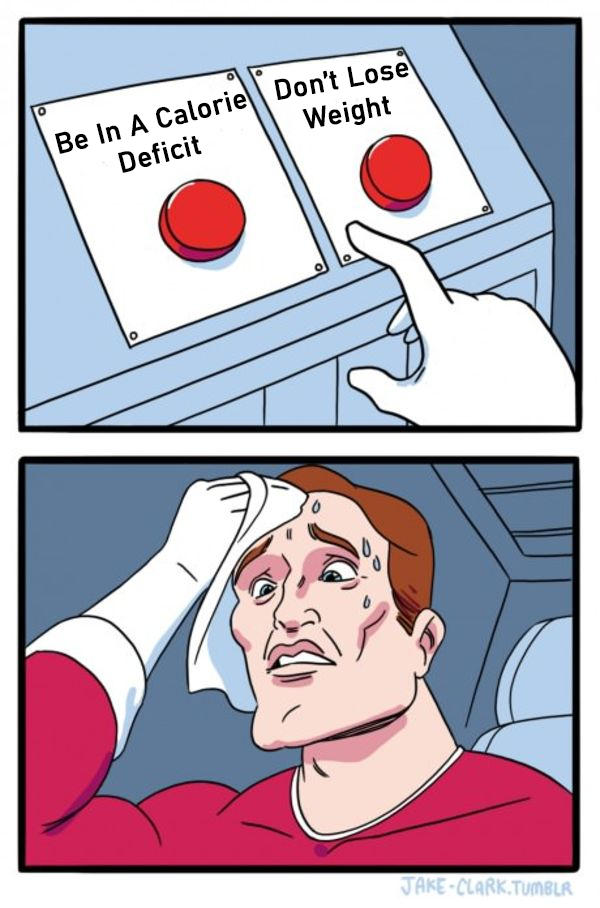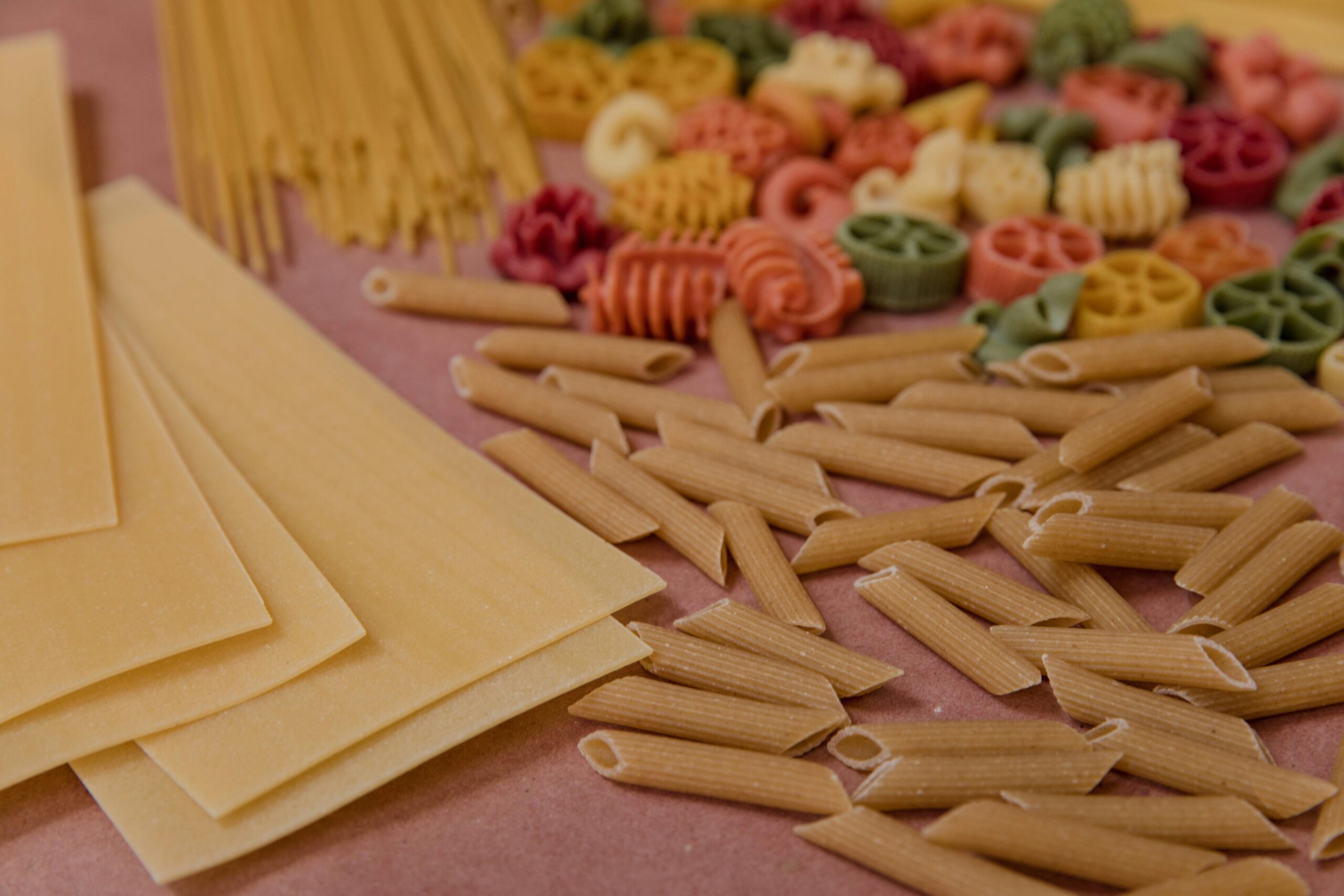Why is the weight-loss industry so saturated with BS? 
-
- “You have to detox your body first”
- “Cut seed oils”
- “Starvation mode”
- “Anything you eat after 6 PM turns into fat”
All of those things are false, but they do an excellent job confusing people.
Here’s the bottom line: consume fewer calories than you burn and you will lose weight. If you’re not losing weight, you’re not in a calorie deficit. It’s that simple.
But people try to overcomplicate it in a variety of ways. Let’s go through a few of the most popular myths.
Myth 1: “It’s All Genetics—My Family Is Just Overweight”
Truth: Genetics likely play a role, but your body will respond to a calorie surplus and deficit.
So many people believe this one. They feel stuck in a box, like, because their family is overweight they have no choice but to be overweight too.
And here’s the truth: yes, you more likely to be obese if your parents are obese (source). There is likely a genetic and behavioral factor.
BUT:
If obesity runs in your family, it’s due to one simple thing: you are in a calorie-surplus often and put on weight. That’s it.
Your resting metabolic rate is mostly due to two factors: mass and sex… NOT genetics (source). The rules of biology don’t change just because your sister’s fat. Once you know how many calories you burn each day (see our calculator for more details), all you have to do is eat at a calorie deficit and viola! The rest of your family’s obesity doesn’t matter.
Good news: your DNA isn’t an unbreakable contract. Yes, having overweight parents raises your odds, but what you really inherit is environment—mealtime habits, movement patterns, even the snacks stocked in your pantry.
What the science says
-
-
A large study was conducted where twins were overfed by 1,000 calories a day, then they were put into a calorie deficit.
Twin pairs ended up losing and gaining about the same amount of weight, but there was variation between twin pairs. That suggests there is a genetic element.
-
-
-
BUT: In a calorie surplus, every person gained weight. In a calorie deficit, every person lost weight. Suggesting: yes, genetics do play a small role, but your body will respond to calorie deficits and surpluses. You are not stuck with a body type due to genetics. (source)
-
How to use it
-
-
Audit habits, not chromosomes: track calories and macros, you’ll see the changes you want.
-
Introduce one “family swap” (e.g., protein-first breakfasts) so the whole house rewires cues.
-
Myth 2: “Metabolism Tanks After 30—Good Luck After 40”

Truth: Your metabolism doesn’t change between 20 & 60 years old.
It’s no secret that college kids in their 20s on average are in better shape than their decades-older counterparts. (source)
However, the story we’ve been told is a lie. Weight-gain is still under your control, it doesn’t just increase because your metabolism “slowed down.”
What the science says
-
-
A 6 400-person doubly-labeled-water study found total energy expenditure holds steady from age 20 to 60; meaningful decline doesn’t start until your 60s. (source)
Meaning: Your metabolism does not shift between ages 20 and 60.
-
Weight creep in mid-life usually comes from more calories in and fewer calories out (desk jobs, kids’ leftovers, less sleep).
-
How to use it
-
-
Don’t be down on yourself for putting on calories in your 30s, 40s, and 50s. Many people do it. HOWEVER: Realize your weight-gain is still under your control.
-
If you want to lose weight, a calorie-deficit still works no matter your age.
-
Mini takeaway: Your calorie burn doesn’t snooze until retirement age—keep the budget honest.
Myth 3: “Cut Carbs or You’ll Never Lose Fat”
Truth: Weight-loss doesn’t come from any 1 macro. Weight loss comes as you’re in a calorie deficit.
Carbs wear the black hat this decade, fat wore it in the ’90s. The scale? It only cares about calories.
I don’t recommend eating like crap and just reducing your calories, but guess what: that would work. In fact, the Twinkie diet proved it (see the next section).
But don’t listen to the fad diets. No one food item or food category is making you fat, it’s your overall calorie intake vs. calorie expenditure.
What the science says
-
-
The 12-month DIETFITS RCT (609 adults) showed no significant difference in weight-loss between low-carb and low-fat when calories and protein were similar. Weight loss is about calories. (source)
-
Neither insulin levels nor “carb-craving genes” predicted who lost more.
-
How to use it
-
-
Calories in, calories out. That’s how you lose weight.
-
HealthkickHQ recommends you still eat carbs so you have energy throughout the day. 40% protein, 30% carbs, and 30% fats are the breakdown we recommend. That keeps you full, maintains muscle mass, regulates hormones, and gives you energy as you lose weight.
-
Myth 4: “You Can Eat Junk and Still Lose Weight”
Truth: This is actually mostly true. However, if you want to stick to a diet long-term, you need to pay attention to nutrition.
This one’s mostly true—Dr. Mark Haub lost 27 lb in 10 weeks on an 1 800-calorie Twinkie Diet. (source)
However, having worked with many people on weight-loss, if you’re not enjoying your food and feeling full/energized, you won’t be able to stick to a diet long-term.
Eating junk causes harm in other ways. If you want to maintain muscle mass as you lose weight, you have to eat enough protein. If you want to regulate hormones and feel healthy as you lose weight, you need enough fats. And if you want energy to go throughout your day and/or exercise, you need carbs.
What you don’t need? Endless amounts of sugar.
Takeaways
-
-
Weight on the scale is due completely to calorie intake vs. calorie expenditure.
- If you want to be able to stick to a diet long-term, have energy, maintain muscle mass, maintain weight loss, regulate hormones, and note feel like crap: we recommend you still pay attention to nutrition.
- “I have never seen someone whose goal was to get as much junk food as possible within their calorie limit stick to weight-loss long-term,” – HealthKickHQ Coach.
-
Summary:
Here’s a TL;DR
-
- Stop with the excuses, you can still lose weight.
- If you consume fewer calories than you burn, you’ll lose weight. If you’re not losing weight, you’re not in a calorie-deficit.
- Pay attention to nutrition, 40% protein, 30% carbs, 30% fats, and you’ll feel full, healthy, and energized during your weight-loss journey.
Ready to lose weight and change your life? Check out our free weight-loss beginner’s guide and go on a Health Kick!
